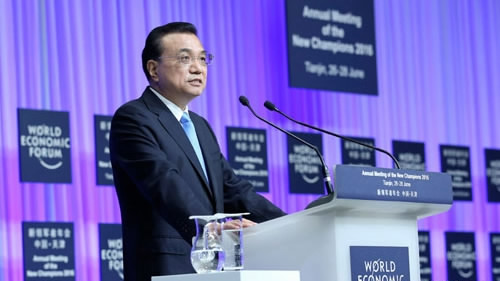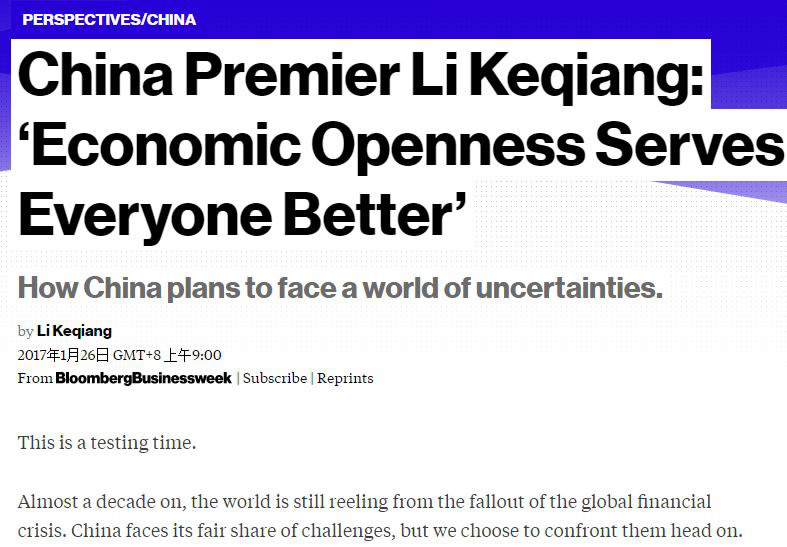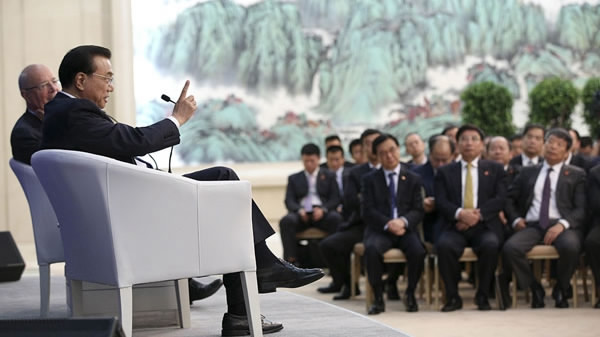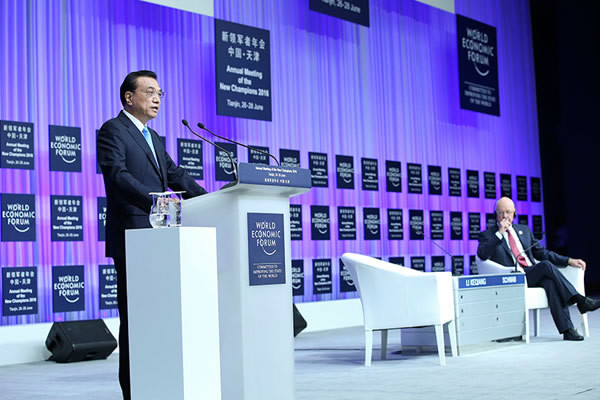
Politics
20:30, 26-Jan-2017
China sticks to openness, offering anchor of stability, Premier Li says
Updated
10:38, 28-Jun-2018

Chinese Premier Li Keqiang has said that China will stick to economic openness and offer stability and growth to the global economy with active measures and reforms.
"This is a testing time," Li wrote in the latest edition of Bloomberg Businessweek, which will be published on Friday. "Almost a decade on, the world is still reeling from the fallout of the global financial crisis. China faces its fair share of challenges, but we choose to confront them head on."

Screen grab of Chinese Premier Li Keqiang's article published on Bloomberg's website on January 26, 2017
Screen grab of Chinese Premier Li Keqiang's article published on Bloomberg's website on January 26, 2017
China remains convinced that economic openness serves everyone better, at home and abroad, he said. "The world is a community of shared destiny. It's far preferable for countries to trade goods and services and bond through investment partnerships than to trade barbs and build barriers."
"Should differences arise, it behooves us all to discuss them with respect and a keen sense of equality," he added.
Despite difficulties, economic globalization has enabled the creation and sharing of wealth on an unprecedented scale. "China stands resolute with the World Trade Organization and multilateral free-trade agreements designed to be inclusive," Li said.

Premier Li Keqiang meets with representatives of business leaders attending Summer Davos Forum in Tianjin, north China, on June 28, 2016. /Xinhua Photo
Premier Li Keqiang meets with representatives of business leaders attending Summer Davos Forum in Tianjin, north China, on June 28, 2016. /Xinhua Photo
The Chinese premier listed a series of measures the Chinese government has adopted in recent years to reduce red tape, cut taxes, open new sectors to investment, boost domestic demand and expand the safety net for the most vulnerable members of society.
"More measures are in the pipeline to ensure all businesses registered in China are treated equally," Li wrote.
In the article, Li referenced data to show that China's structural reforms in recent years have shown positive results.
In 2016, China shed more than 65 million and 290 million tons of inefficient steel and coal-mining capacity respectively. A total of 700,000 laid-off workers nationwide were re-employed in new jobs last year, Li noted.

Premier Li Keqiang speaks at the opening ceremony of Summer Davos Forum in Tianjin, north China, on June 28, 2016. /Photo via gov.cn
Premier Li Keqiang speaks at the opening ceremony of Summer Davos Forum in Tianjin, north China, on June 28, 2016. /Photo via gov.cn
Services and consumption have become China's new growth drivers. Entrepreneurship and innovation are taking root, said Li.
"Meanwhile, new business models are thriving, transforming many previously unimaginable services into daily conveniences. The mobile-internet-enabled sharing economy is only one obvious case," he explained.
The Chinese economy grew a healthy 6.7 percent last year, adding more than 13 million jobs every year since 2013, and keeping the unemployment rate at a multi-year low.
"In a world with a plethora of uncertainties, China offers an anchor of stability and growth with its consistent message of support for reform, openness and free trade," the premier stated in the article.
(Source: Xinhua)

SITEMAP
Copyright © 2018 CGTN. Beijing ICP prepared NO.16065310-3
Copyright © 2018 CGTN. Beijing ICP prepared NO.16065310-3